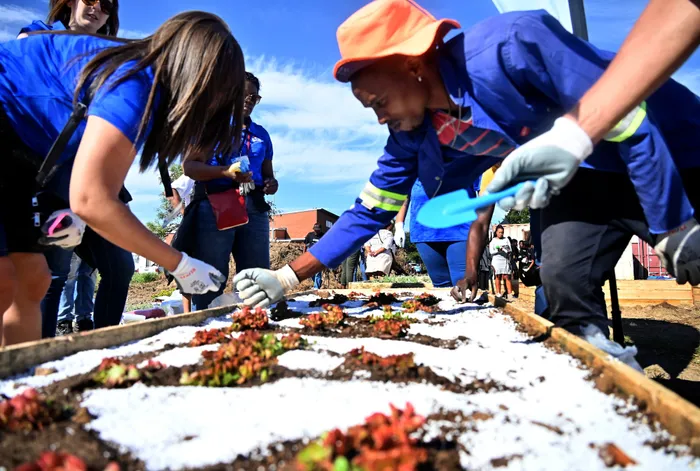Innovation key to halting food insecurity in Africa

Picture: Ayanda Ndamane African News Agency (ANA) - Cape Town-based non-profit Save Our Schools (SOS) launching a long-term project, Water in the Sky at Bloekombos Secondary School in Kraaifontein to further the message of preserving water with water scarcity endangering food security, health and hygiene.
By Gwinyai Taruvinga
When the Russia-Ukraine war started last year, one of the key concerns for the African continent was that of food insecurity. Ukraine’s food exports such as wheat, barley, and sunflower oil would feed 400 million people worldwide.
The conflict brought to the fore how food insecurity can be fuelled by several issues, including conflict, climate change, and poor governance within countries.
Food insecurity has been particularly of huge concern for the African continent where the number of under- nourished people has continued to rise over the last 35 years.
Food security is linked to citizens having physical and economic access to sufficient food to meet their dietary needs for a productive and healthy life. The Food Aid Organisation (FAO) further elaborates on this by listing four key pillars: availability, access, utilisation, and stability. These pillars are essential to understanding the various dynamics of food security in the Global South. In the Horn of Africa, for example, the Covid-19 pandemic, the conflicts in the region, and droughts exacerbated the challenge of ensuring citizens had access to food.
In this region, it was believed that over 80 million people faced the possibility of being food insecure as it was expected that 37 million people would be at the mercy of an acute hunger crisis. In the Horn of Africa, a combination of various issues such as drought and conflict has resulted in food insecurity for the region. Conflict has often been seen to be a major contributor to food insecurity and this occurs both directly and indirectly. In many cases, crucial infrastructural damage can affect the ways through which citizens can have access to food.
Broader impacts of conflict can, however, result in trade routes being closed and the collapse of local markets as seen with many war-torn countries. In northern Ethiopia, the civil unrest in that region resulted in a negative impact on humanitarian efforts aimed at assisting the vulnerable.
The Horn of Africa’s food security scenario can further be linked to the Russia-Ukraine war as the two countries are at the heart of global agricultural markets and the conflict has so far shown that there are major implications for the African continent at large. Russia and Ukraine were at one point the third and fourth leading exporters of barley, and combined they make up 20% of the world’s barley production.
To add more perspective, the World Bank notes that the number of people suffering from acute food insecurity increased from 135 million in 2019 to 345 million in 82 countries by June last year.
For the Horn of Africa, the reliance on staple crops from Russia and Ukraine was seen as being a chief contributor to the ongoing food crisis in the region thus showing the impacts of conflict both internally and externally.
Climate change has also been dubbed as a major contributor to food insecurity globally. It has influenced weather patterns resulting in heat- waves, heavy rainfall, and droughts.
Due to climate change, 80% of the global population deemed to be at risk from crop failures and hunger are in sub-Saharan Africa where subsistence farming is key to families’ ability to produce food. As seen with the El Niño weather patterns, millions of citizens can be pushed into poverty due to the impacts of climate change. The El Niño phenomenon was commonly linked to the droughts witnessed in southern Africa and extreme rainfall in eastern Africa.
Due to El Niño several countries in the southern African region witnessed dry cropping seasons which resulted in successive harvest failures which aggravated food and nutrition security showing how climate change has a major impact on food security. More recently, Cyclone Freddy in Malawi showed how climate-induced natural disasters have an impact on food security in African coun- tries. Due to the agrarian nature of African societies in countries like Malawi extreme weather has ramifications for food production. Village dwellers in Malawi rely on maize crops but Freddy destroyed many of the crops.
Agriculture is essential to Malawi’s economy and over two million farmers lost their crops and more than 179 000 hectares of crop fields were destroyed. In addition, the prices of grain in Malawi skyrocketed. The price of maize per kilogram in the range of 1000 Malawian kwacha (US95 cents) is out of reach to the average farmer.
The cyclone also destroyed the electricity infrastructure in Malawi which is crucial for mills that process maize into flour thus showing the ripple effects of climate change in Africa.
Several efforts have been mooted by African governments to improve food security. One of the key efforts is the introduction of smart agriculture which involves the use of technology to improve farming efforts. Smart agriculture, at least in theory, helps reduce costs and improve the quality and quantity of products. It has often been deemed to be a costly initiative, but it is viewed as one of the methods to deal with climate change.
More importantly, as seen with the Russia-Ukraine conflict, the African continent needs to make use of its regional bodies such as the South- ern African Development Community and the Economic Community of West African States, and at a broader level, the AU should have mechanisms to withstand global wars and droughts.
At the state level, African countries should implement people-driven policies that are aimed at mitigating the contributing factors to food insecurity.
*Gwinyai Taruvinga is a Post-doctoral Research Fellow at the Wits Humanities Graduate Centre.